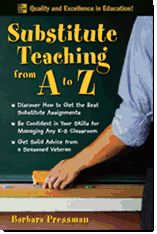|
 |
| Teachers.Net Gazette Vol.5 No.10 | October 2008 |
Subscribe for free home delivery |
|
How much should I tell students about myself? & How can I keep the class quiet during independent work times? | |
|
Dear Barbara - Advice for Substitute Teachers by Barbara Pressman The author of Substitute Teaching from A to Z (McGraw-Hill, 2008) Regular contributor to the Gazette October 1, 2008 |
|
|
How much should I tell students about myself? Dear Barbara,  One other problem I often have is sometimes students secretively roll objects or make mouth sounds when the class is busy, and it would not seem effective to play detective. I've tried threatening to detain the class when the bell rings, but that threat never stops it. And when I move to the source of the sound, the source often moves too. Thanks for the opportunity to communicate about this challenging job.
Marilyn
Dear Marilyn, I’m glad you enjoyed the book! Your concerns about subbing in secondary school are not unusual. It is a challenging age group. Let me address your questions one at a time.
As you can see, the introduction should be very short to start with. As you continue to sub, you might get more personal, but only if it feels comfortable. With secondary students, you must be aware of the climate of the group. Barbara How can I keep the class quiet during independent work times? Dear Barbara, I finally graduated with a teaching degree at the age of 53, and have been “subbing” for the last year and a half. I’m writing because I consistently seem to have a problem in the K-5 classrooms I teach in: what I refer to as “breakout talking.” I can have the students quietly working, and gradually the students begin to talk to one another at their tables, until the noise level rises to what I consider to be very unacceptable. (This happens while I am working on helping students who are having trouble, or trying to check student work, answer questions, etc.) I then have to STOP the class, interrupting even those who ARE doing what they are supposed to be doing, to get order and quiet reestablished. This newly established order lasts anywhere from 3-10 minutes or so; then the whole cycle repeats itself – with me getting more and more frustrated. I have tried having them sit quietly for 5 minutes or so with heads down on desks, to “practice quiet,” but enforcing that quiet, even for 5 minutes, is sometimes more exhausting than anything else. Invariably, someone will talk before the time is up; and we have to start all over again. In a way, this is the students controlling ME, because we are losing actual on-task working time, but I really don’t know what else to do! Sometimes I call the principal or other administrator to come in and settle the class down, if it is too bad; however, as soon as they leave, the same thing happens! I don’t want to spend valuable class-time fighting this all day, but what do you do, when the whole class keeps getting out of control? Sometimes, nothing works! (One school I sub at is urban, lower-income, and I feel students are not really held accountable for their behavior. But this happens at the suburban schools somewhat, too.) I want to control the classroom and be the very best teacher I can be! HELP, please! Sincerely, Christine, Newport, KY Dear Christine, Congratulations on your graduation and teaching degree. Subbing is a great way to get your foot in the door. The practical experience is invaluable. I gather from your letter that students are quiet during teaching time. But when they begin independent or group work, “break out talking” begins. We all experience this problem. I have some suggestions for you:
Remember, rewards can be concrete, or verbal. Students love praise. “Thank you for working quietly, class.” The rewards for you will be worth it! Barbara | |
|
 Cover Story by Eric P. Jensen
Cover Story by Eric P. Jensen


